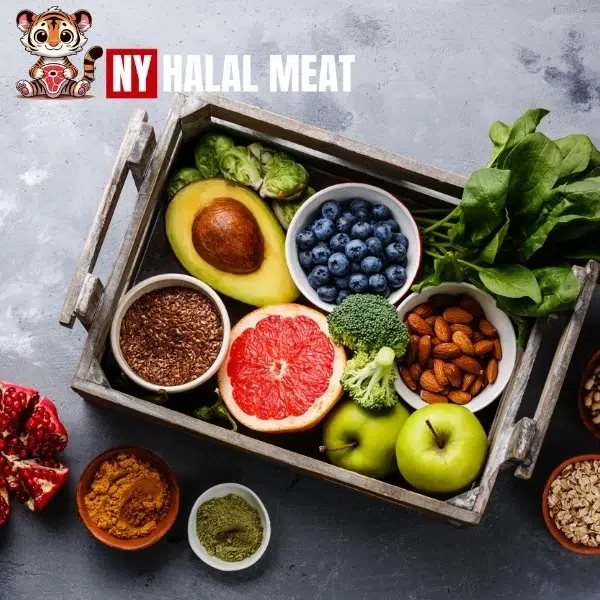Halal Options for Pregnant and Breastfeeding Women
Why Nutrition Matters During Pregnancy and Breastfeeding
Pregnancy and breastfeeding are times of rapid growth and change, requiring higher levels of certain nutrients. Key nutrients include:
- Protein: Supports the development of the baby’s muscles, tissues, and organs.
- Iron: Helps prevent anemia and supports increased blood volume.
- Calcium: Essential for developing strong bones and teeth in the baby.
- Folate: Prevents neural tube defects in the baby.
- Healthy Fats: Support brain development and provide energy.
Halal food options can easily meet these nutritional needs while adhering to dietary laws.
Top Halal Food Options for Pregnant Women
1. Lean Halal Meat
Halal-certified lean meats such as chicken, lamb, and beef are rich in protein and iron, prepared with strict hygiene standards.
- Benefits: Supports muscle growth and prevents iron deficiency.
- Preparation Tips: Opt for grilled, baked, or steamed meats to retain nutrients.
2. Halal-Certified Fish
Fish like salmon, mackerel, and sardines are packed with omega-3 fatty acids, supporting the baby’s brain and eye development.
- Benefits: Omega-3s promote brain health and reduce the risk of preterm birth.
- Preparation Tips: Limit high-mercury fish and opt for safer choices.
3. Eggs and Dairy Products
Halal-certified eggs, milk, yogurt, and cheese provide calcium, vitamin D, and protein, important for both mother and baby.
- Benefits: Strengthens bones and teeth and supports muscle function.
- Preparation Tips: Always choose pasteurized dairy products to avoid foodborne illnesses.
4. Legumes and Lentils
Legumes like chickpeas, lentils, and kidney beans are rich in iron, folate, and fiber, making them great plant-based protein sources.
- Benefits: Supports red blood cell production and promotes healthy digestion.
- Preparation Tips: Add legumes to soups, stews, and salads for a nutrient-packed meal.
5. Fruits and Vegetables
Fresh, seasonal fruits and vegetables provide essential vitamins, antioxidants, and fiber.
- Benefits: Boost immunity, aid digestion, and promote overall health.
- Preparation Tips: Choose organic produce and wash thoroughly.
6. Whole Grains
Halal-certified whole grains like brown rice, quinoa, and whole-wheat bread are great sources of energy and fiber.
- Benefits: Provide sustained energy and prevent constipation.
- Preparation Tips: Incorporate whole grains into meals as a healthy base or side dish.
Top Halal Food Options for Breastfeeding Women
1. Hydration with Halal Drinks
Halal-certified drinks like water, herbal teas, and fresh fruit juices are great choices to stay hydrated while breastfeeding.
- Benefits: Help with milk production and prevent dehydration.
- Preparation Tips: Avoid sugary drinks and excessive caffeine.
2. Healthy Fats
Foods like avocados, nuts, and seeds are natural sources of healthy fats, providing energy and supporting the baby’s brain development.
- Benefits: Improve breast milk quality and provide essential fatty acids.
- Preparation Tips: Add them to meals or enjoy as snacks.
3. Dates
Rich in natural sugars, iron, and potassium, dates offer an excellent energy source for breastfeeding mothers.
- Benefits: Provide a natural energy boost and support iron levels.
- Preparation Tips: Enjoy them as a snack or add to smoothies for extra flavor.
4. Halal Soups and Broths
Nutritious soups made with halal meat and vegetables are easy to digest, comforting, and rich in nutrients.
- Benefits: Provide hydration, protein, and vitamins in one meal.
- Preparation Tips: Use halal meat and add vegetables for added nutrients.
Meal Planning Tips for Halal Diets
- Balanced Meals: Include a mix of proteins, healthy fats, and carbohydrates in every meal.
- Smaller, Frequent Meals: Eat smaller meals throughout the day to maintain energy levels.
- Avoid Processed Foods: Stick to fresh, halal-certified products.
- Supplements: Consult a healthcare provider about halal-certified prenatal vitamins.
Foods to Avoid During Pregnancy and Breastfeeding

- Raw or undercooked meats and eggs.
- Unpasteurized dairy products.
- High-mercury fish.
- Excessive caffeine.
- Processed snacks with questionable additives.
Conclusion
Halal food options offer a healthy and ethical way to meet the nutritional needs of pregnant and breastfeeding women. By incorporating nutrient-rich halal foods into your diet, you can support your health and the development of your baby. Always consult your healthcare provider for personalized advice and dietary guidance during this critical time.



[…] Muslims Use “Bismillah” in Daily […]